










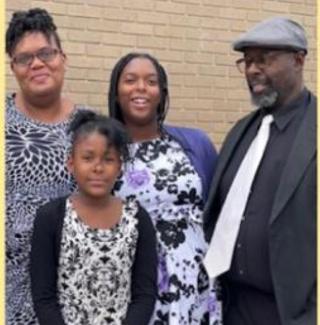























M
ore than five hundred years ago, a spiritual earthquake shook the foundationsof Europe. With one bold act—nailing 95 theses to the church door in Wittenberg—Martin Luther lit the spark that would become the Protestant Reformation. But the real tremor wasn’t about politics or power; it was about truth. Eternal truth. Gospel truth. Truth that still shakes the world.
This October 26-31, our church will journey back to the biblical heart of the Reformation in a powerful 6-part revival series titled “Alone: The Truth that Shook the World.” Each message will focus on one of the great “solas” of the Reformation—the core convictions that redirected the church back to the gospel and can reignite our hearts with revival today:
Sola Scriptura – Scripture Alone
Sola Fide – Faith Alone
Sola Gratia – Grace Alone
Solus Christus – Christ Alone
Soli Deo Gloria – To the Glory of God Alone
Afinal appeal to follow Christ
As we conclude this series on October 31st, the anniversary of Luther’s bold stand, we will be inviting men, women, and young people to make their own stand—for Christ, for truth, for new life.
Why This Revival Matters
We live in a world filled with noise, confusion, and compromise. Many people—inside and outside the church—are weary, searching, and unsure where to turn. But the answers are not new. They are ancient, powerful, and unchanging. The gospel of Jesus Christ, revealed in Scripture, received by faith, offered through grace, centered in Christ, and lived to the glory of God is still the power of God unto salvation.
Every revival begins with prayer—and every revival spreads through personal invitation. Right now, there are people in your life who are searching for hope, truth, and something real. Maybe they’ve been disappointed by religion or never given the Bible a fair hearing. Maybe they’ve walked away from church, or maybe they’ve never had someone invite them in. This is your moment to be that someone.
As we prepare for this revival, we ask each member and friend of Arden to begin praying intentionally and specifically for someone to bring with them. Ask God to put one or two names on your heart—family members, coworkers, neighbors, classmates, or friends. Pray that God will prepare their hearts to receive the invitation—and that He will give you the courage and compassion to extend it.
A revival isn’t just about filling pews; it’s about changing lives. Let’s think beyond ourselves. Let’s think about who might be in the kingdom one day because you cared enough to invite them to hear the gospel.
Here are a few simple steps to help prepare your heart and home for revival:
Pray daily for the series, the preacher (That’s me!), and those you will invite. Ask God to move in power.
Read and reflect on the five solas in Scripture. Let them rekindle your own faith.
Invite boldly: print invitations, send texts, make calls, and bring someone with you.
Attend faithfully. Set aside the revival nights as sacred appointments with God.

Expect transformation—in your life, in our church, and in the lives of guests.
Let’s Shake the World—One Soul at a Time
The truths of the Reformation aren’t dusty doctrines from the past. They’re living, breathing, soulsaving realities for today. They center us on Jesus, empower us with grace, and ground us in Scripture. They restore joy, give assurance, and call us to courage.
So let us come together this October—hungry, humble, and hopeful. Let us open our hearts and doors to those who need the good news. And let us believe that the same gospel that once shook the world can shake our community again.
Mark your calendars. Start your prayers. And start making your invitations.“
This revival is not just a history lesson; it’s a heart call. It’s an invitation to rediscover the beauty of the gospel, to return to our first love, and to recommit ourselves to the mission of making disciples. It’s a season of spiritual refreshing and a time for the Holy Spirit to move in our church with clarity and power.
Alone: The Truth that Shook the World”
A6-part revival series – October 26 through October 31
Each night will include powerful preaching, prayer, music by Clint McKoy, and an invitation to follow Christ.
Let’s not let this moment pass us by.

By Lindsay Reynolds
In 1929, Harold Marshall Sylvester Richards, Sr. (a.k.a. H.M.S. Richards, Sr.) launched a modest series of radio broadcasts that evolved into one of the most enduring Christian media ministries in North America—The Voice of Prophecy. For 95 years, the Voice of Prophecy has consistently preached, taught, and uplifted the name of Jesus through radio, print, and digital media. From humble beginnings in a makeshift studio to today’s expansive multimedia ministry, the Voice of Prophecy has adapted and grown while remaining true to its original mission: to proclaim the everlasting gospel of Christ.
The Voice of Prophecy origins can be traced to a pivotal moment in 1929, when H.M.S. Richards, Sr., a Seventh-day Adventist pastor and evangelist in California, held a series of Bible prophecy meetings. One night, walking back to his hotel, Richards passed rows of California homes, lights glowing within. He wondered: How could he reach the people behind those doors who might never attend a church service? That walk sparked a radical idea— using the still-emerging technology of radio to share Bible truth beyond the walls of a church or tent meeting.
At the time, in-home radio was still a novelty. In 1931, two years after Richards began his broadcasts, only 40% of American homes owned a radio. Many church leaders viewed radio with suspicion, even calling it “the Devil’s tool.” Undeterred, Richards forged ahead, convinced that radio was a God-given opportunity to reach the unreachable. His first program, titled The Tabernacle of the Air, was recorded and broadcast from a cleaned-up chicken coop in his garage—an early sign of the determination and resourcefulness that would characterize the ministry for decades. By 1937, the program was officially renamed The Voice of Prophecy. It quickly gained traction, becoming one of the first religious broadcasts to be aired across the entire United States.As its popularity soared, so did its influence, ushering in a new era of evangelism through mass communication.
Correspondence School (later renamed the Discover Bible School), which gave listeners an opportunity to study the Bible through the mail. Within a month, the school enrolled 2,000 students. By 1946, that number had skyrocketed to 85,000. The program was supported by memorable music from the King's Heralds quartet and soloist Del Delker, adding warmth to the ministry’s broadcasts.
The reach of the Voice of Prophecy expanded dramatically during the 1950s and 1960s. More than 1,300 radio stations around the world carried the program, broadcasting in over 30 languages. The combination of preaching, Bible study, and music gave the ministry a distinct appeal that resonated with listeners across cultural and geographic boundaries.
In 1969, as H.M.S. Richards, Sr. stepped back from his role, his son, H.M.S. Richards, Jr., assumed leadership as speaker/ director. The transition marked a new chapter, but the core mission remained unchanged. Over the years, a number of dedicated individuals have continued the work, including Lonnie Melashenko, Fred Kinsey, and most recently, Shawn Boonstra. Under Boonstra’s leadership, the ministry has embraced modern media platforms while remaining grounded in the foundational values established nearly a century ago.
Today, the Voice of Prophecy continues to share the message of Jesus through a variety of channels, including radio, video, print, podcasts, and online platforms. One notable addition has been Discovery Mountain, a dramatized Christian podcast series for children. Designed to teach biblical values through storytelling, the program has become a favorite among families and children around the world.

I recently spoke with Jean Boonstra—wife of Shawn Boonstra and author and key creative force behind Discovery Mountain at the 2025 ASI Convention in Orlando about her excitement over the program’s continued growth and reach. Jean and Shawn Boonstra are relocating to Maryland for Shawn’s new role with the Adventist Review, however, she affirmed her plans to be actively involved in both the Voice of Prophecy and Discovery Mountain from her new location.
As the Voice of Prophecy approaches its 100th year, its legacy stands as a testament to visionary faith, adaptability, and a deep passion for evangelism. From the crackling airwaves of early radio to the immersive world of children’s podcasts, the ministry has never wavered in its purpose: to make the good news of Jesus Christ accessible to all. Whether spoken from a pulpit, broadcast through the air, or streamed through a smartphone, the gospel continues to shine brightly through this faithful ministry.
References:
During the 1940s, as the world was gripped by the turmoil of World War II, the Voice of Prophecy offered messages of hope and peace. In 1942, the ministry launched its Bible
Blake, Amanda. “The Voice of Prophecy Turns 95 Years Old.” Voice of Prophecy, 5 Nov. 2024, voiceofprophecy.com/articles/news/voiceprophecyturns95yearsold. Accessed 4 Aug. 2025.
Boonstra, Shawn. “Expanding the Work Full.” Voice of Prophecy, Voice of Prophecy, Accessed 4 Aug. 2025, www.voiceofprophecy.com/newsletters/expanding-work-full Page 3 | www.ArdenAdventist.org

by Barry Mahorney
When I asked ChatGPT to paint a picture of a hero (with no other parameters), AI “painted” a portrait of Superman. What comes to mind when you hear the word hero? What picture do you see?
When we consider heroes in the Bible, they are always people of faith. They have a connection with God. In fact, they are not heroes at all, God is.
It is with this in mind that I turn our thoughts to a group of people we know as the Waldenses. If asked, “Are the Waldenses a people group or a religion?” The simple answer is, “Yes.” At least this was so during the Dark Ages. During this somber time in history, the Waldenses were truly a “people of the Book.” They were among the first people in Europe to have the Bible in their own language. They loved the Word of God, and for this reason they were hated by the Church of Rome. It was illegal to possess the Scriptures, but it was a firm belief in the Bible that resulted in their refusal to attend mass, worship idols and relics, and pray for the dead.
Allow me to back up and explore with you, the origin, life, and persecution of this faithful people. No agreement of belief unites historians regarding the origin of the Waldenses. However, more modern writers proclaim Peter Waldo (a.k.a. Valdes) the father and founder of the Waldenses. While Waldo played an important role in the lives of the Waldensians in the 12th century, there is significant evidence they pre-dated Waldo by hundreds of years. The earlier writers taught and wrote that the origin of these people went back to or near apostolic times. Interestingly, the only records of an earlier origin of the Waldenses come from their enemies. When these people were invaded by Roman armies, they attempted to destroy any and every evidence these people even existed. But one of the Inquisitors wrote that the Waldenses were the most dangerous heretics because they were the most ancient. While there were earlier persecutions, the most difficult times were between the 15th to the 17th centuries. During this 250+ years, thirty-three wars
raged against the Waldenses with the stated goal to completely annihilate these rebel heretics. Thousands died at the hands of the Roman and Savoyard soldiers. (Savoy was a district located in south-eastern France, just below Lake Geneva). Homes and crops were burned and the most inhuman torture was inflicted on these faithful people. Their only crime – refusal to bow to Rome’s edicts.
The nerve center of the Waldensian valleys (Cottian Alps) was Angrogna at the Pra Del Tor where the College of the Barbes was located. (A barbe – local name of affection meaning “uncle” – was an itinerant preacher.) Here young men came to train and prepare to be missionaries. The young men would spend three winters here studying, memorizing, and copying Scripture. Other studies included some basic medical training. At the end of three years, the young students would connect with an older, experienced barbe to begin their missionary journey under the guise of merchant or peddler. Some even entered one of the universities for advance training, but (more importantly) as missionaries and incognito. Unfortunately, many of these young missionaries never returned home, often being killed in the line of duty.


Many illustrations describe the horrific persecutions against the Waldenses, but I will write about only two. The first is usually referred to as the Easter Massacre of 1655. The Council of Propaganda 1622 had recommended the persecution of “depraved heretics.”
And the most ruthless of their persecutors was the Marquis of Pianezza. The decree of January 1655 ordered that all heads of families leave their home in the villages and move up into the valleys within three days. The Waldenses attempted to change the minds of the government leaders but to no avail. In the meantime, Pianezza marched his soldiers on Torre Pellice, but was held off by the Waldenses.
Pianezza decided to try a different ploy. He somehow convinced the Waldenses he was only after a few rogue individuals. If they would only house his soldiers to show their loyalty to the duke, they would be protected. Early Saturday morning, the day before Easter, a signal was sounded and the soldiers turned on their hosts, killing them. Many of the Waldenses – who managed to flee – made it up the mountain to a place
called Castelluzzo. Sadly, they were followed by Pianezza’s men and hundreds, if not thousands, were cast to their death. The atrocity was discovered by the Protestant nations around them and Oliver Cromwell’s private secretary, John Milton, wrote the epic sonnet: On the Late Massacre in Piedmont.
“Avenge, O Lord, thy slaughter’d saints, whose bones Lie scatter’d on the Alpine mountains cold, . . .”
Though this event stirred the wrath of the nations around them, nothing really changed. In fact, only thirty years later, danger loomed again.
In 1685, Louis XIV, king of France was convinced by his confessor that to be sure of his eternal destiny, he should, at once, begin a campaign to kill all Protestants in France. Because theFrenchHuguenotswholivedclose to the border of Savoy, fled to Waldensian valleys for protection, Louis communicated with Victor Amadeus II, Duke of Savoy, what was happening and that he should begin the extermination process as well. While not inclined to agree, he was finally convinced by a threat made by Louis that French soldiers would do the work, then Savoy would be annexed to France.
The Waldenses put up a fight but could not compete. Some ten thousand or more Waldenses were taken to prison, churches were burned, and babies were taken and given to Catholic families. Within a few months, half the prisoners had died. Eventually, an agreement was made, and three thousand Waldensians were sent to Switzerland. It was mid-winter, and most were sick and barely clothed. Many died along the way. Some died at Switzerland’s door while others looked like walking skeletons. In Switzerland, they were welcomed and cared for by the Swiss.
leaving food, guns, and ammunition behind. God had blessed.
This was and would continue to be a treacherous and dangerous journey. When they arrived at a place called Sibaud, just above the village of Bobbio, they took an oath that they would remain true to their leaders, each other, and their mission to the “last drop of our blood.”
After a confrontation with soldiers in Villar Pellice, the Waldenses made their way to the mountain above the village of Bal Ziglia. With felled trees and boulders, they fortified themselves from the French troops below. Attempts were made by thousands of troops below to fire on them, but their guns couldn’t reach that far. When the soldiers tried to climb the steep mountain, a very dense fog caused them to give up their ascent. The French soldiers left for the winter but returned in the spring twenty-two thousand strong with two small cannons and the confidence this fight would soon be over. These cannons were moved up the mountain and across the torrent to an area level with the encampment of the Waldenses. Finally, they were confident this small, Waldensian army would be crushed.
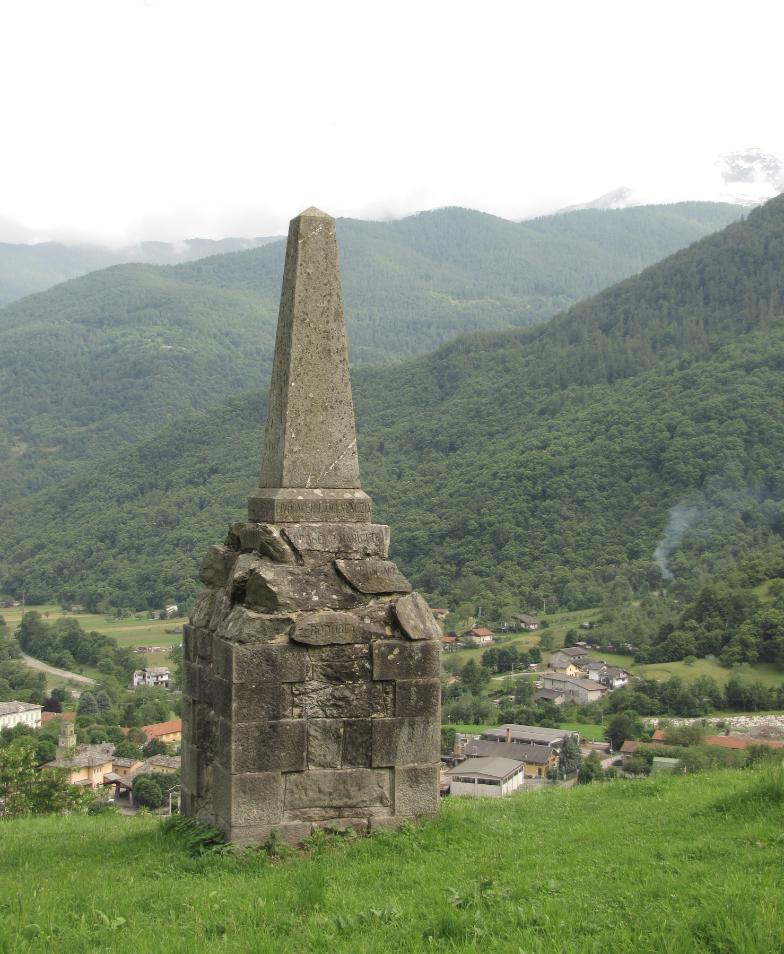
Three years later and after two failed attempts, nine hundred men under the leadership of Henry Arnaud, minister and soldier, set off in small boats across Lake Geneva to make their way toward home. The first ten days went rather well. Then coming to Sal Bertrand, Henry and his men were tipped off that there was trouble ahead. When they reached a bridge, it was night and they could see many small camp fires on the other side. These were the fires of 2,500 French troops. The Waldenses were also aware that soldiers were coming from behind. Arnaud led his men in a brief prayer session. On finishing, they began crossing the bridge when shots rang out. Falling to the ground they waited, hoping the gunfire would cease. However, someone among the Waldenses shouted, “Let’s go. We’ve got this bridge.” The French troops – not knowing how many enemies were advancing – fled,
That evening Henry Arnaud held a prayer meeting with his men and shared with them that they had done all they could – and tomorrow they may be defeated. As the night wore on, another dense fog enveloped the mountain. A native of the area, Tron-Poulat, assured them that having grown up on this mountain, he knew every inch and every trail. If they would trust him, he would get them off this mountain to safety. Under cover of darkness and fog, the men, holding on to each other andat timeson their handsandknees, made their way down a steep and dangerous trail. They crossed the torrent and hiked up the adjoining mountain. The next morning when the French troops were sure their mission was about to be accomplished, they realized the Waldenses had escaped from their death grip. Having made their escape, they made their way safely out of harm’s way toward Angrogna where they were met by one of the duke’s men, telling them that the Duke of SavoyAmadeus had shifted his allegiance and that now they and their families could return home. This experience ended what has since been called the Glorious Return.
While this is only a small portion of the Waldensian story, throughout their history, the Waldenses were ever faithful. They were true Christian heroes because they chose to follow God’s Word and offer Him their complete allegiance.

N
atalie Nelson came hurrying across the veranda to where her father (82 y.o. Albert Groot, aka Pawpaw) sat napping. “Dad, are you awake?”
Pawpaw slowly opened one eye. “I am now, dear.” He chuckled and reached out his hand. “I wasn’t asleep; just resting.”
Natalie grasped her father’s hand and sat down on the hassock next to his feet. “Could you talk with Mark –sometime, soon.”
“Of course, what’s the problem?”
“He’s thinking about changing his major in college. Says he thinks he wants to be a preacher.”
“Okay.” Pawpaw sat up straighter in his lounge chair. “That will require a . . . careful touch. Where is he now?”
“He’s hiking with Matthew on one of those trails up above us.”
She pointed up and to the left of the mountain cabin they had rented for a week’s getaway before the boys returned to school.
Later that evening Pawpaw and Mark relaxed in two porch chairs watching the sunlight fade over the mountain ridge to their west. “Earlier today your mother said you were thinking of changing your major.”
huge task?”
Mark cocked his head questioningly. “They were to wait in Jerusalem until they received the Holy Spirit, Pawpaw. His spiritual gifts would empower them to do this task.”
“Correct, again.” Pawpaw nodded and closed his eyes again. “Are any of these gifts any more important than others?”
“No, Pawpaw. All the gifts are equally important. The greeter at the door is as important as the musician or the children’s storyteller or the pastor. Each serves in their own giftedness and contributes to the service and growth of the whole church. I don’t think that preaching is more important than teaching.”
“Okay. Just checking.” Pawpaw held up both hands in mock surrender. “Let me try a different tack.” He took a deep breath. “What else does a pastor do – besides preach?” When Mark didn’t answer, Pawpaw continued. “A pastor does more than preach, important as that is. A pastor trains the congregation. He tries to ensure that all other church members know what their spiritual gift is and how to use it – and are serving where their spiritual gift counts. He organizes, directs, trains, encourages, and empowers the others.”
Mark sat forward, resting his elbows on his knees, his mouth resting on the back of his hands.

Mark nodded. “Oh, that.” He cast a sidelong glance at his grandfather’s face, saw that his eyes were closed, then looked away. “Yeah, I was considering it.”
“Because . . .?”
Mark quickly sat up. “You remember that sermon I preached last May?”
“I remember a talk you gave in the chapel.”
“Yeah, that one.” Mark hurried on. “Afterward, someone told me: ‘You should be a preacher.’ I’ve been thinking about it ever since.”
Pawpaw was quiet for several minutes, then . . . “What is the Great Commission, Mark?”
“Go ye into all the world and preach the gospel – and so forth.”
“The whole world?” Pawpaw reached for his iced tea glass. “And how were the disciples to accomplish this
“You once told me that you wanted to be the teacher, not the principal, in a school. You wanted to teach, not lead.” Mark slowly nodded his head.
“Do you know what your spiritual gift is?”
Mark took a deep breath and blew out. “No, not really.”
“What are you currently doing in service to God?”
“I’m helping Mom teach the Earliteen Sabbath School Class.”
“Wow!” Pawpaw laughed and shook his head. “That’s a tough age group to teach.” When Mark nodded in agreement, Pawpaw continued, “And what do you love more than any other about teaching that class?”
Mark’s face lit up. He lifted his hands and opened wide his fingers as he said, “The moment the light bulb goes on – when I’m explaining something. I live for that moment.”
Pawpaw nodded vigorously. “And what do you make time for over any other activity choices?”
“Preparing the lessons, Pawpaw. I love teaching the kids.”
“I’ve seen you doing it.” Pawpaw sat back and relaxed. “We serve God best – not by our skin color, our language, our cultural upbringing, or our gender – but in our giftedness.” Then raising his index finger, “And be careful when people say nice things about you, you will start to believe them.”
“Yes, Pawpaw. I’m learning.” Mark nodded. “That can be dangerous – on many levels.”

Hearing the words “Bible heroes,” who immediately comes to your mind? Part way through my own list, I realized that many “great” Bible heroes and heroines have major flaws. In fact, many could be labeled antiheroes by some definitions.
Certainly our human parents, the man and woman of Eden, had a fatal flaw. Abraham and Sarah treated Hagar with dreadful apathy. Jacob was a cheat; many of his sons even worse. Impulsive anger leading to actions causing Moses to flee Egypt at forty kept him from entering the Promised Land at one hundred twenty. Gideon had doubt and that troublesome ephod. Neither Eli, nor Samuel, nor David could discipline their children – plus adultery and murder for that famous king. Elijah tried to commit suicide that God did not allow. For some time Esther wouldn’t tell anyone of her background and Peter wouldn’t admit he knew who Jesus was.And Saul, who wanted to arrest and kill Christ-followers until Jesus literally stopped him in his tracks. Out of the big Bible names, only a few—like Joseph, Ruth, Daniel, and Jesus—seem to really have it together. However, some quiet heroes placidly inhabit Scripture. Though not knowing all the details, what I am told of their stories makes me want to know more, ‘cause they just seem like committed, decent people. Here’s a few for your consideration, then maybe you’ll want to nominate some of your own for the Bible’s “unsung heroes” awards.
Babylonian advance, this Ethiopian eunuch (looked down upon by most as a foreigner and flawed, forbidden to enter temple grounds) cared for Jeremiah’s well-being, saving the prophet’s life.
Simon of Cyrene (Luke 23:26; Mark 15:21): This quiet hero from a coastal Greek colony city (now northeastern Libya) in North Africa was in Jerusalem for the Pesach (Passover) holiday. He happened by as Roman soldiers propelled Jesus through the streets from the Governor’s palace to Golgotha. By law, Roman soldiers could compel civilians to carry a load and this they did – to Simon. He was coming infrom the countryside, where pilgrims camped during the festival, to proceed to the temple rites of the Pesach. Instead, Simon became part of the ultimate Passover experience, shouldering a burden for Jesus Himself in His hour of trial. Mark’s gospel mentions Simon’s sons, Alexander and Rufus; church traditions say they became missionaries, carrying the gospel of the Messiah whose cross their father carried.
Stephen, Philip & his daughters (Acts 6-8; 21:8-9): Seven Greek Christians “of good reputation, full of the Spirit and wisdom” were appointed as deacons. Two of them: Stephen and Philip (and Philip’s four daughters), all powerful preachers, workers of miracles through the Holy Spirit, and/or prophets, edified the growing church. Stephen was murdered by religious enemies, but as he fell, called for grace and forgiveness toward those taking his life. Philip listened to the Holy Spirit (as did his hospitable and prophetic daughters), breaking down barriers, as Scriptures show him caring for both Samaritans and Ethiopians, kindly and engagingly sharing the story of Jesus.
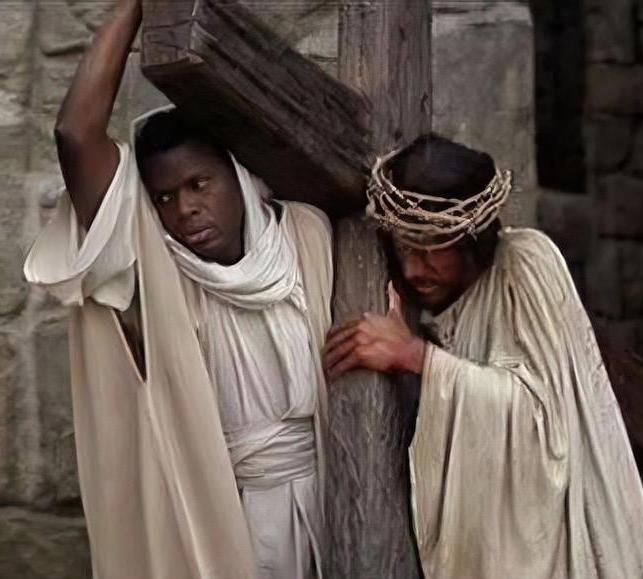
Tabitha/Dorcas (Acts 9:36-42): Most famous for being raised back to life by God after Peter’s prayers, the description of Tabitha describes her as a quiet hero. She was clearly loved by her friends. The widows of Joppa attested that she was full of practical kindness and “completely filled up” with generous deeds and compassionate giving. What a lovely reputation!
Shiphrah & Puah (Exodus 1:15-21); Mahlah, Noah, Hoglah, Milcah, & Tirzah (Numbers 27:1-11): These seven women are mentioned by name in the Exodus cycle because they refuse to accept injustice. Shiphrah and Puah defy Pharaoh’s wrath to save many Hebrew infants from death. The five sisters petition God for an inheritance. All are motivated by a love and reverence for God and for their people. God rewards them all, saying they did right, and includes their legacy in Scripture for all time.
Ebed-Melech (Jeremiah 38:7-13): When the enemies of Jeremiah flung the prophet into a pit to die during the
Paul’s Friends: Prisca (Priscilla) & Aquila, Luke, Onesiphorus, and others! Throughout the book of Acts and the Pauline letters, Paul developed a core group of companions who significantly helped him and his mission at various times. Prisca & Aquila were early helpers who worked together with Paul while making tents, their joint livelihood. Luke, the physician traveled with Paul, giving aid and comfort on occasion, but also recording many of their adventures in the book of Acts, as well as researching and writing down an account of Jesus we call the gospel of Luke. Onesiphorus “refreshed” Paul “many times,” not ashamed of his imprisonment in Rome, but made special effort to find Paul and bring him encouragement. These friends were quiet heroes for their kindness and their help in shaping the New Testament scriptures we have today!

Have you ever felt the weight of carrying a grudge? That heavy feeling in your chest when someone’s name comes up in conversation, or the way past hurts suddenly flood back when you least expect them? You’re not alone. We’ve all been there, holding onto pain that someone else caused us, believing that our anger protects us or serves justice.
But what if holding onto that hurt is actually hurting you more than anyone else?
Forgiveness isn’t just a nice idea or religious concept — it’s actually essential for your mental health and the quality of your relationships. When we understand what forgiveness really does for us, we discover it’s one of the most powerful tools we have for healing and connection.
Studies consistently show that people who forgive experience better psychological well-being than those who hold onto resentment. In a comprehensive study of 456 adults, researchers found that forgiveness directly improves mental health by helping people overcome the negative thoughts and feelings tied to past offenses.¹ When you forgive, you don’t just help the other person — you give yourself freedom from the mental burden of anger and hurt.
Because forgiveness is fundamentally about emotion regulation. When we’ve been hurt, our natural response is to replay the offense, harbor resentment, and plan ways to protect ourselves. But research shows that forgiveness engages our selfregulatory strength — our ability to control impulses and manage emotions in healthier ways.² Instead of being controlled by negative emotions, forgiveness helps us take back control of our mental state.
Unforgiveness is like carrying a heavy backpack everywhere you go. Over time, that weight affects how you walk, how far you can travel, and how much energy you have for other things. Forgiveness is the decision to set that backpack down.
Forgiveness doesn’t just help you feel better — it actually makes you better at relationships. Recent research found that people who are willing to forgive are significantly better at solving interpersonal problems.³ They approach conflicts more constructively, avoid negative behaviors, and take more responsibility for finding solutions.
When you practice forgiveness, you become less likely to hold grudges, are more willing to work through difficulties, and better at seeing situations from other perspectives. You create a positive cycle; all your relationships improve, supporting your overall well-being.
Forgiveness affects how we handle future conflicts. Forgiving regularly makes us less likely to avoid conflict or negatively approach problems. Instead, we engage more directly and positively, leading to healthier conflict resolution.
Research reveals that resentment can cancel out the positive effects of forgiveness on mental health.⁴ It’s not enough to say you forgive someone if you still harbor angry feelings. True forgiveness involves the decision to forgive and the emotional work of releasing resentment. Forgiveness isn’t excusing bad behavior or pretending the offense didn’t hurt. It’s choosing not to let that person’s actions continually control your emotions.
The good news: forgiveness benefits everyone involved. Research shows that not only do victims of offense experience better mental health when they forgive, but perpetrators who genuinely seek forgiveness and learn to forgive themselves also experience improved psychological well-being,⁵ making possible opportunities for genuine relationship healing.
Finally, forgiveness has a deeper meaning. Jesus taught us to pray, “Forgive us our debts, as we also have forgiven our debtors” (Matthew 6:12). This isn’t following rules; it’s understanding that forgiveness is how God designed relationships to work best. When we forgive others, we participate in the same grace God shows us every day. We acknowledge 1) we all need forgiveness and 2) healing is possible even after deep hurt. This can make forgiveness easier, reminding us that we’re not perfect either.
Biblical forgiveness creates a model for healthy boundaries. Forgiving someone doesn’t mean you trust them immediately or put yourself in harm’s way. It means you choose not to let their actions poison your heart and mind.
Forgiveness is a process, not a one-time event. Some hurts are deeper than others; some relationships need more time to heal. Start small. Practice forgiving minor offenses quickly, not letting them build up. For deeper hurts, remember: forgiveness is primarily about your wellbeing, not theirs. You don’t forgive them because they deserve it; you forgive them because you deserve peace.
Consider talking to a counselor, pastor or trusted friend about significant hurts. Sometimes we need help processing our emotions before we can truly let go.
Forgiveness is one of the most powerful tools for improving your mental health and strengthening your relationships. Start by deciding to let go of the resentment you’ve been carrying. Choose to stop letting others’ actions control your emotional state.
Your future self — and your relationships — will thank you for taking this step toward healing and freedom.
References:
1. Gismero-González, E., Jódar, R., Martínez, M. P., Carrasco, M. J., Cagigal, V., & Prieto-Ursúa, M. (2020). Interpersonal Offenses and Psychological Well-Being: The Mediating Role of Forgiveness. Journal of Happiness Studies, 21(1), 75–94.
2. Ho, Man Yee, et al. “The Role of Self-Regulation in Forgiveness: A Regulatory Model of Forgiveness.” Frontiers in Psychology, vol. 11, May 2020, p. 1084.
3. Büyükbayraktar, Ç., Yalçın, S. B., ÖZTÜRK, İ. Y., & Say, S. (2025). Exploring the Relation: Does Forgiveness Enhance Interpersonal Problem Solving? Behavioral Sciences, 15(1), 35.
4. Bankard, Joseph, et al. “The Interaction between Forgiveness and Resentment on Mental Health Outcomes: Two Sides of the Same Coin?” Religion, Brain and Behavior, Nov. 2022, pp. 1–11.
5. Griffin, Brandon J., et al. Forgiveness and Mental Health. Springer, Dordrecht, 2015, pp. 77–90.
Eight-letter words are hidden in the six groups below. Find the words by choosing the correct letter from each vertical pair of letters. For instance, to find the example word CONVINCE, choose C from the CR pair, the O from the IO pair, the N form the PN pair, etc.
Example: C I P V K A C E

SYLLABILITY –
Choose one syllable from each column to form six words, each with four syllables. Use each syllable only once. Do not change the order of the syllables; if the syllable appears in the 3rd column, it is the third syllable of the word. As above, all words are from the Passion Week. 1 2 3 4

by Max Hammonds
The original meaning of the Greek word “martur” is “witness.” The followers of Jesus were told to witness “in Jerusalem, and in all Judea and Samaria, and even to the remotest part of the earth."(Acts 1:8) They were to “go into all the world and preach the gospel.” (Mark 16:15) On the Day of Pentecost in the Upper Room, they received the Holy Spirit which empowered them to carry out this assignment. So effectively did they “witness” for Jesus, sharing the story of God’s gracious love, they converted hundreds of thousands in the then-known world from the fear-driven traditional and national religions to the freedom of Christianity.
Kings and emperors – not understanding that Christ’s kingdom was “not of this world” – were fearful that these cultural changes would disrupt their governance structures as well. They did not understand that Christianity made people a more moral, well-behaved citizenry – more easily ruled and more likely to support the government. (Romans 13:1-8)
True, Christians served only the true God and despised the idolatrous, often immoral, even violent religious practices of other cultures. This opposition to heathen rituals effectively stopped the power of Satan from working through these religious and cultural practices. Therefore, Satan used the blind, ignorant ruling governments to stir up hatred against Christians. They accused the Christians of destroying cultures and blamed them for whatever mishaps occurred – famines, epidemics, fires, earthquakes, wars, or civil unrest.
classes of the Jews – beheaded the apostle James, brother of the apostle John in 37 AD.
Then followed the uprising of violent persecution against all Christians in Jerusalem (Acts 8:1; 11:19) causing a rapid dispersion of Christians into areas and countries surrounding Judea – to Samaria, Syria (to the north), Parthia (to the north and east), Cyprus and Crete (to the northwest), and Egypt (to the south). This diaspora eventually included most of the remaining ten apostles.
Matthew witnessed in Jerusalem for a time during the diaspora but eventually traveled to Egypt and effectively converted a large number of the populus to Christianity (martyred).
Nathaniel Bartholemew traveled northeast and witnessed in Mesopotamia (Lebanon), Parthia (Persian empire area), and Armenia (martyred – 66 AD).
Andrew traveled even further north to witness in Scythia (central Turkey), Trace, Byzantium, and Crimea (on the Black Sea), Kiev (Ukrainian planes), and finally Achaea (Greece) (martyred – 60 AD)
ThomastraveledeasttoParthiaandthenintomuchofIndia (martyred – 72 AD).
The apostle Philip traveled north to Syria, Phrygia (Turkey), and on into Greece (martyred).

Judas Thaddeus first ministered in Judea and Idumea (southeast), then went west to Libya, then north to Mesopotamia (Lebanon) (martyred – 65 AD).
James the Younger witnessed in Jerusalem (martyred).
Simon Zelotes traveled south to witness in Libya and Egypt, then to the northeast to Persia and Armenia (some say even to Britain) (martyred).
Simon Peter (with John) witnessed in Jerusalem but was one of the last to leave, traveling northwest to Cappadocia, Galatia, and Bithynia (northern Turkey), then to Rome (martyred by Nero – 64 AD).
Mark the Evangelist traveled with Paul for s short time, then with Peter (as interpreter), writing the Gospel of Mark, then evangelized northern Egypt in Alexandria (martyred – 68 AD).
Paul the Apostle witnessed extensively in Antioch in Syria, throughoutAsia Minor, in Greece, and in Rome (martyred by Nero – 64 AD).
Therefore, persecution and ultimately, death of these “witnesses” became so common as to cause the word “martyr” to be used for the persecution of the witnesses –even unto death.
The first of the “martyrs” to suffer such persecution and violent death were some of those present in the Upper Room that day – including the eleven apostles (Judas Iscariot having died by suicide). The effective work and witness of the disciples of Jesus in Jerusalem caused the members of the Sanhedrin and the priestly class eventually to stone Stephen, one of the original deacons, in 34 AD. Following closely on this “martyrdom,” Herod Antipas – to please the ruling
John the Apostle – like Peter – remained in Jerusalem for a time, then traveled west to witness in Ephesus from where he was banished to Patmos, then released to return to Ephesus where he died of natural causes about 100 AD. By the destruction of Jerusalem, almost all of the earliest Church Fathers were martyred. They were told by Jesus that: “because of your witness” persecution will come, yet will lead to an opportunity to witness even more, but for some will lead to death. (Luke 21:12-17) For them, to know this and do it anyway required great faith in Jesus and the bold commitment of a hero (one who knowing the consequences, does the right think anyway). For us, knowing that this happened to them and is likely to happen to us, requires the same (Revelation 12:17; 14:12; Daniel 12:1).

Our family focus this month features Amiel and Terry-Ann Nelson who joined the Arden Seventh-day Adventist church in July.
Amiel was born and raised in Connecticut as a Seventh-day Adventist and baptized when he was a teenager. He has Jamaican heritage roots and has one brother.
Terry-Ann was born in Jamaica and lived there until she was nine years old when she and her family moved to New York City. She was also raised as a Seventh-day Adventist. She has two sisters and three brothers.
Amiel attended public schools through high school and earned his B.A. degree from the University of Connecticut in Economics. He has worked as a Data Analyst for the Health Services of Georgia for four years. Since their move to western North Carolina, he has been looking for work.
Terry-Ann attended public schools in New York. She received her Associate’s Degree from the Northern Caribbean University in Business Administration and her Bachelor’s Degree from Washington Adventist University in Organizational Management. She also earned her Master’s Degree in Teaching from SIT University (School for International Training) in Vermont. She worked as an elementary school teacher for four years and spent one year teaching in middle school in Conyers, Georgia. Currently she has accepted a position at our Capt. Gilmore Christian School and is looking forward to the new experience.
Amiel and Terry-Ann met when she visited Amiel’s church in Connecticut. They have been married for sixteen years and have two daughters, Melia, fourteen years old and Anniela, ten years old.
Most recently, they lived in Conyers, Georgia but decided to move to this area, wanting the best schools for their daughters and needing Terry-Ann’s new position at Captain Gilmer School. TerryAnn loves decorating and enjoys creating home décor design. Amiel enjoys working on any type of gadgets and electronics. They enjoy vacationing in Florida and taking the occasional trip back to Jamaica to see family.
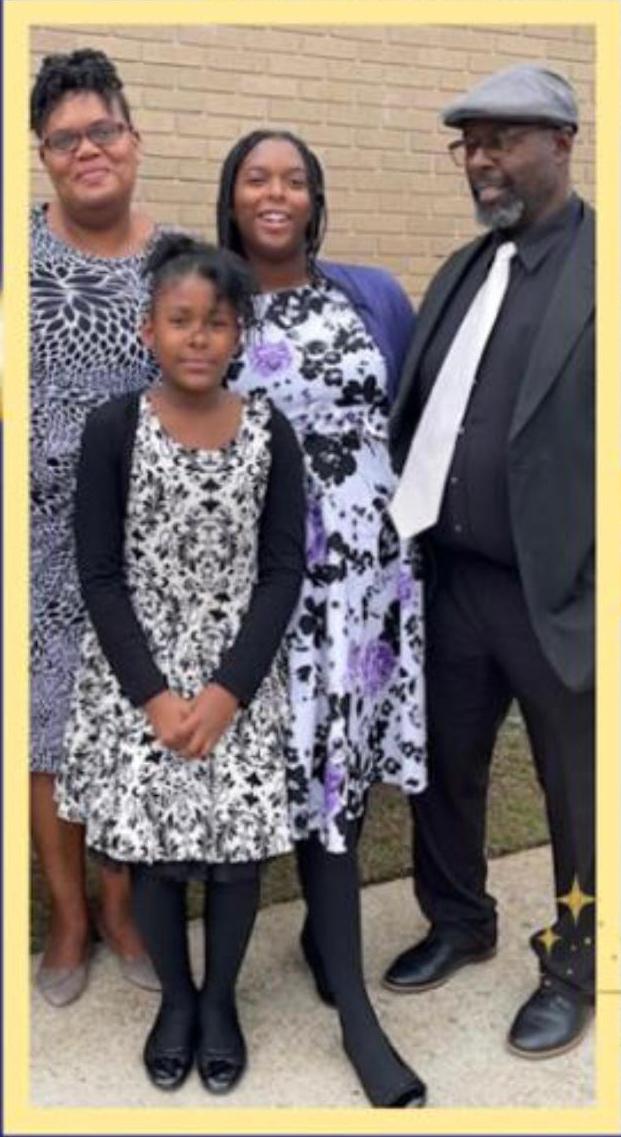
When Amiel and Terry-Ann lived in Connecticut, they were members of a wonderful family-centered church. While visiting this area, they looked at three different churches, searching for the same kind of family life in a church. They were very impressed with the different activities that Arden has to offer, which led to visiting the Arden church. They felt this church would be a wonderful home church for them. They are looking forward to visiting different Sabbath School classes and finding the small family group that meets their needs and expectations.
We welcome the Nelson family to the Arden church family!
Arden Seventh-day Adventist Church Is a Safe Place to Grow.
Our Purpose is, by God’s Grace, to reflect His character in our community, to demonstrate a quality of life that will attract all to be reconciled to Jesus Christ, and to encourage people to become His loving, maturing disciples.
Grace Notes Editorial Staff:
Max Hammonds......................................Editor
Chris Small.........................................Columnist
Jean Davey.........................................Columnist
Max Hammonds..........Reporter & Columnist
Pen Braister-Sturgis.............................Reporter
Sara McCord.........................................Reporter
Dan Reynolds.......................................Reporter
Arizona McCord.......Reporter & Proofreader
Chris Small .............................Special Graphics
Jim & Carolyn Sullenberger........Proofreaders
Nolan Darnell................Mailing Management
Shirley Wallstrom..........Circulation Manager
Whitney Barron.........................Layout Design
Comments, suggestions and praises are always welcome. Please email or contact the church office.
Services each Saturday morning: Sabbath School Bible Study, 9:30 a.m. Worship Service, 10:45 a.m.
Location: 35 Airport Road, Arden, NC 28704 Located on Highway 280, (Airport Road), 1.5 miles east of I-26 exit 40, and a quarter mile west of Highway 25.
Church Office:
Office Manager: Cindy Cottrell
Office Secretary: Summer Cronin Telephone: (828) 684-6700
Email: office@ardenadventist.org
Website: www.ardenadventist.com
Office Hours: Mon., Wed., Thurs.,9 a.m. to 3 p.m.
Arden Adventist Pastoral Staff: Senior Pastor: Eric Bates, D. Min. Email: ebates@carolinasda.org
Associate/Youth Pastor: Rich Maskelony, M .Div. Email: rmaskelony@carolinasda.org
Grace Notes is published monthly by the Arden Seventh-day Adventist Church. Subscription is free by calling or emailing the office. †Do you have questions about what Adventists believe? Would you like to become a member of the Seventh-day Adventist Church? Would you like to study the Bible? You are invited to attend a Pastor’s Bible Study Class. Please call for location and time. All are always welcome.
† Disclaimer—The contents of Grace Notes, such as text, graphics, images, and other material contained in this magazine of the Arden Seventh-day Adventist Church are for informational purposes only. It is not intended to be a substitute for professional medical advice, diagnosis, or treatment. Always seek the advice of a qualified healthcare provider, who is knowledgeable and experienced in the use of specific medical or Lifestyle Medicine interventions, or about questions you may have regarding a medical condition. Never disregard professional medical advice, or delay in seeking it, because of information published in this magazine. Neither Grace Notes nor the Arden Seventh-day Adventist Church recommendorendorseanyspecifictests,products,procedures, opinions, or other information that may be mentioned in published articles. Reliance on any information provided is solelyatyourownrisk.Ifyouhaveamedicalemergency,call your healthcare provider or 911 immediately.


If you no longer wish to receive Grace Notes, or if your address has changed, please contact us.
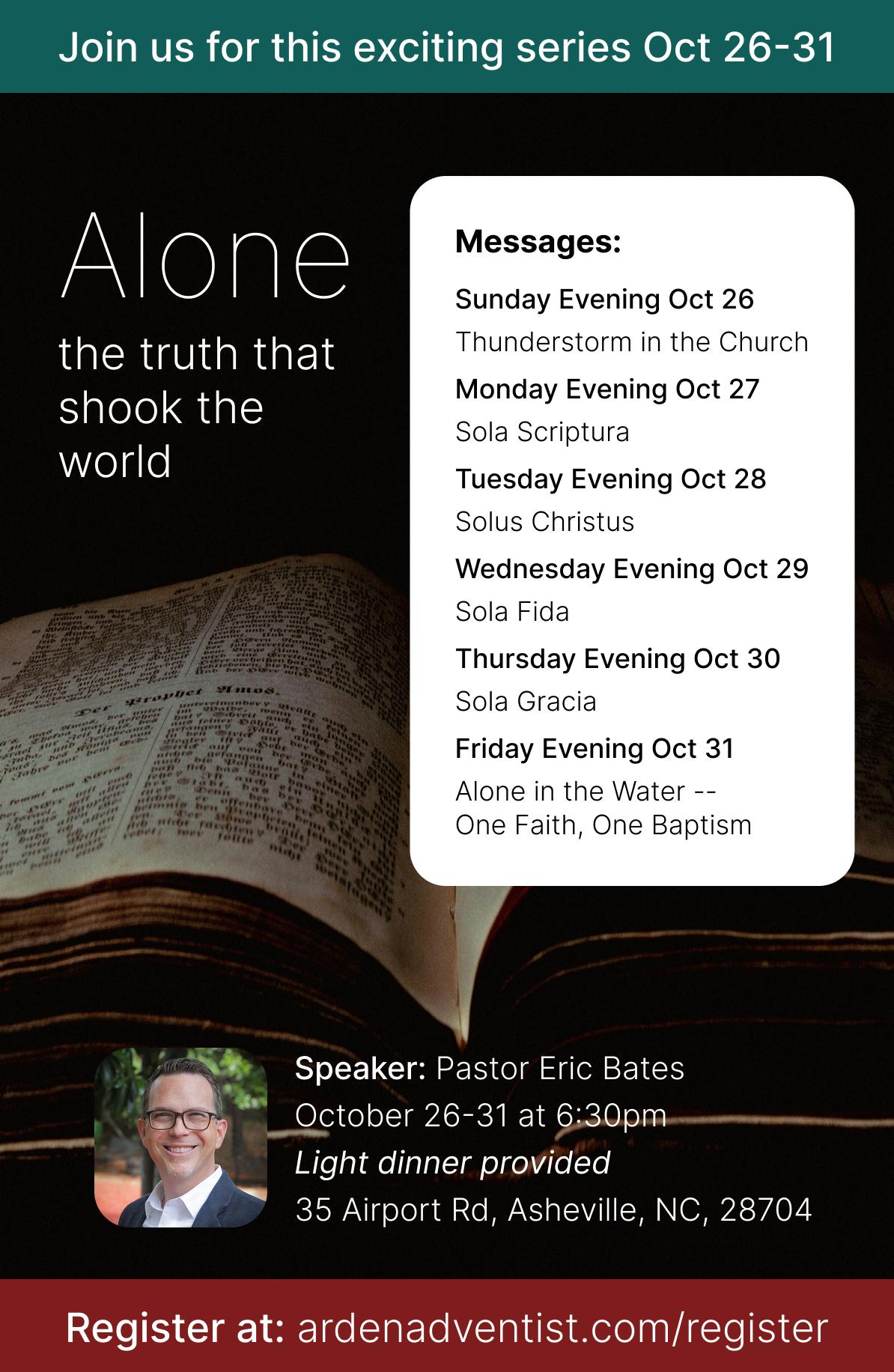




Servings per recipe: 6









19-ounce can chickpeas (also called garbanzo beans)
1 red pepper
1 cucumber
2 celery stalks
1 Cup- Halved grape tomatoes


Juice of 1 large lemon (about 1/4 cup)
1 Tbsp- White vinegar
2 Tbsp- Olive oil
1/2 Cup- Chopped fresh parsley
DIRECTIONS
Servings per recipe: 6








19-ounce can chickpeas (also called garbanzo
1 red pepper
1 cucumber
2 celery stalks
1 Cup- Halved grape tomatoes
Juice of 1 large lemon (about 1/4 cup)
Drain and rinse chickpeas and put in a large mixing bowl. Core red pepper and dice into half-inch squares. Add to bowl. Peel and chop cucumber; slice celery lengthwise and chop. Add to bowl. Add halved grape tomatoes.

1 Tbsp- White vinegar
2 Tbsp- Olive oil
1/2 Cup- Chopped fresh parsley
In a measuring cup or small bowl, whisk lemon juice, vinegar and olive oil. Pour over salad ingredients. Toss well to coat all ingredients. Add parsley and mix again. Refrigerate until ready to serve. Season to taste and serve chilled.
DIRECTIONS
Drain and rinse chickpeas and put in a large mixing bowl. half-inch squares. Add to bowl. Peel and chop cucumber; Add to bowl. Add halved grape tomatoes.

In a measuring cup or small bowl, whisk lemon juice, vinegar ingredients. Toss well to coat all ingredients. Add parsley ready to serve. Season to taste and serve chilled.

Grace isn’t fully knowable inside the monuments we’ve built. Our finest structures merely hint at what the Scriptures call the “breadth and length and height and depth” (Eph 3:18) of love the Father gives us.
Cathedral arches just suggest the soaring kindness of our God. Our well-stocked libraries of knowledge—comprehensively collected; exquisitely curated—tell but a fraction of the story, deeper than our minds can grasp and gentler than our hearts can feel.

Until you stand upon the ocean shore, calling actively to mind that all your sins have been cast into its depths when you believe in Jesus (Mic 7:19), you’ve only sampled moments of God’s grace.
Until you stare in wonder at a midnight sky replete with billions of star galaxies—unknown to us yet still within the orbit of God’s grace—you cannot grasp the promise made to Abraham, whose faith was counted righteousness: “I will multiply your descendants beyond number, like the stars in the sky and the sand on the seashore” (Gen 22:17).
We fall in awe before the love that wouldn’t let this planet go: “For this is how God loved the world: He gave His one and only Son, so that everyone who believes in Him will not perish but have eternal life” (John 3:16).
The impulse to adore the God whose love for us is infinite is one sure sign that grace has found a home in you.
So stay in it.
-Bill Knott